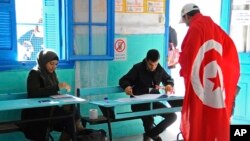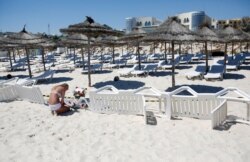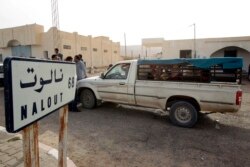As an estimated 6.7 million Tunisian voters prepare to head to the polls to elect their next government later this year, a growing fear of terrorist attacks could risk undermining the democratic process in the North African country, some analysts warn.
Two suicide attackers blew themselves up in two separate bombings against police in the capital Tunis on June 27, leaving at least one police officer dead and injuring eight people. A third bombing occurred on July 2 after a militant surrounded by police blew himself up.
Islamic State militant group claimed responsibility for all three attacks.
The incidents occurred during the peak of the country's tourism season and as the country prepares to hold parliamentary elections in October and presidential elections in November.
The elections are critical for Tunisians in consolidating their democratic process, which began after the ousting of President Zine El Abidine Ben Ali during the Arab Spring protests in 2011, said Sarah Yerkes, an expert on Tunisia at the Carnegie Endowment for International Peace (CEIP) in Washington. As such, the country is going through "a dangerous time" because jihadist organizations that flourish in chaos will likely increase their activities to spread fear among voters.
"I think we are going to see more of these attacks in the months leading up toward the elections," Yerkes said, speaking Tuesday at the "Tunisia at a Crossroads" panel discussion at CEIP.
Unlike its southern neighbor, Libya, where terrorism and armed conflict has plagued the country, Tunisia has taken strides to maintain a relative security, Yerkes said, adding, "Tunisia has done a tremendous job, largely because of the U.S. assistance and the European assistance, at shoring up its security services, security sector reform, and border control."
However, jihadists remain active and pose a serious threat to the Arab country's stability, she said.
Yerkes charged that increased terror attacks could also risk subverting the democratic process by giving authorities a justification to keep the country in a state of emergency.
"The fear is whether these attacks will be a pretense to have a harsher security measure. You can picture that you want to protect the elections and you want people to go out to vote. But if you have heavily armed election stations and if you have soldiers out at polls, that could hamper the democratic process by scaring people away."
Tunisia has been in a state of emergency since mid-2015, when an IS-inspired attack killed 38 people at the Sousse tourist resort in northern Tunisia.
President Beji Caid Essebsi, after leaving hospital Friday, extended the state of emergency for another month in response to the recent bombings in Tunis.
Citing security concerns, Prime Minister Youssef Chahed signed a government order Friday that prohibits wearing a full-face veil — known as niqab — in public places.
Libya and Algeria
Emir Sfaxi, a public policy consultant on Tunisia, said Tunisian officials are concerned a militant threat could be imported from its south and western borders, as Islamists use escalation of Libya's conflict and the Algerian political crisis to gain influence.
"Libya and Tunisia have open borders in a way that you can just cross with an SUV between Tunisia and Libya. Libya has been an open battlefield with guns all over," Sfaxi said, adding that inability to control Tunisia-Libya borders allowed hundreds of radicalized Tunisians to travel to join jihadi groups such as IS in Iraq and Syria.
"I think that foreign powers in general need to keep supporting the Tunisian effort to control its borders as a regional security measure because if Tunisia fails, as the southern border of Europe, it is going to become a mess in the region," Sfaxi said.
Thousands of fighters
A study by Tunisian Center for Research and Studies on Terrorism has found that about 69% of Tunisia's jihadists had first traveled to Libya for military training. It concluded that the uncontrolled border has allowed the free flow of weapons and fighters between the two neighbors.
According to the United Nations, about 5,500 Tunisian citizens have traveled in recent years to Libya, Iraq and Syria to join the Islamic State and al-Qaida. Human Rights Watch, however, estimates the number could be higher, with nearly 6,500 having traveled to Syria and Iraq and about 1,500 to Libya.
With the IS territory in Iraq, Syria, and Libya retaken, many of those Tunisian jihadists who did not die in the battlefield escaped or were captured by U.S.-backed Syrian Democratic Forces and the Iraqi government.
Mokhtar Ben Nasr, the head of the government's National Counterterrorism Commission, last February warned that about 1,000 of the jihadists had returned home between 2011 and 2018. Of the returnees, he said, some were arrested but a larger number re-entered the country covertly.
De-radicalization
Oumayma Ben Abdallah, a human rights researcher and Tunisia analyst, said the Tunisian government should step up its de-radicalization efforts as more fighters return home and risk spreading the jihadi ideology.
"My recommendation at this stage is to focus more on rehabilitation programs," Ben Abdallah said, warning that children and frustrated young people could easily fall prey to those who have returned from combat zones.
"Many terrorists who have fought in Libya and Syria are coming back to the country with no way to be rehabilitated into the society. These people are a great danger for the society as potential recruiters," she said.















